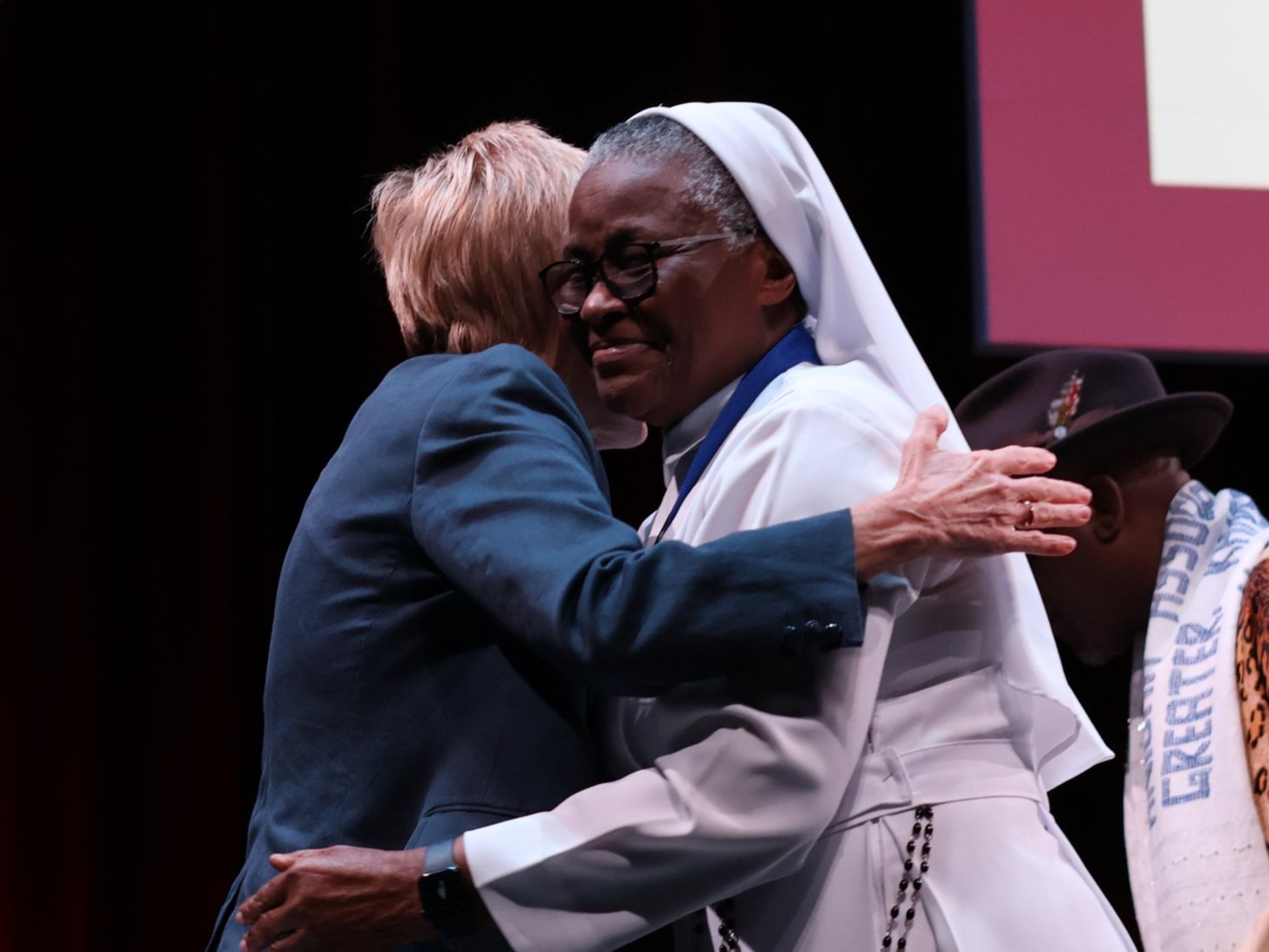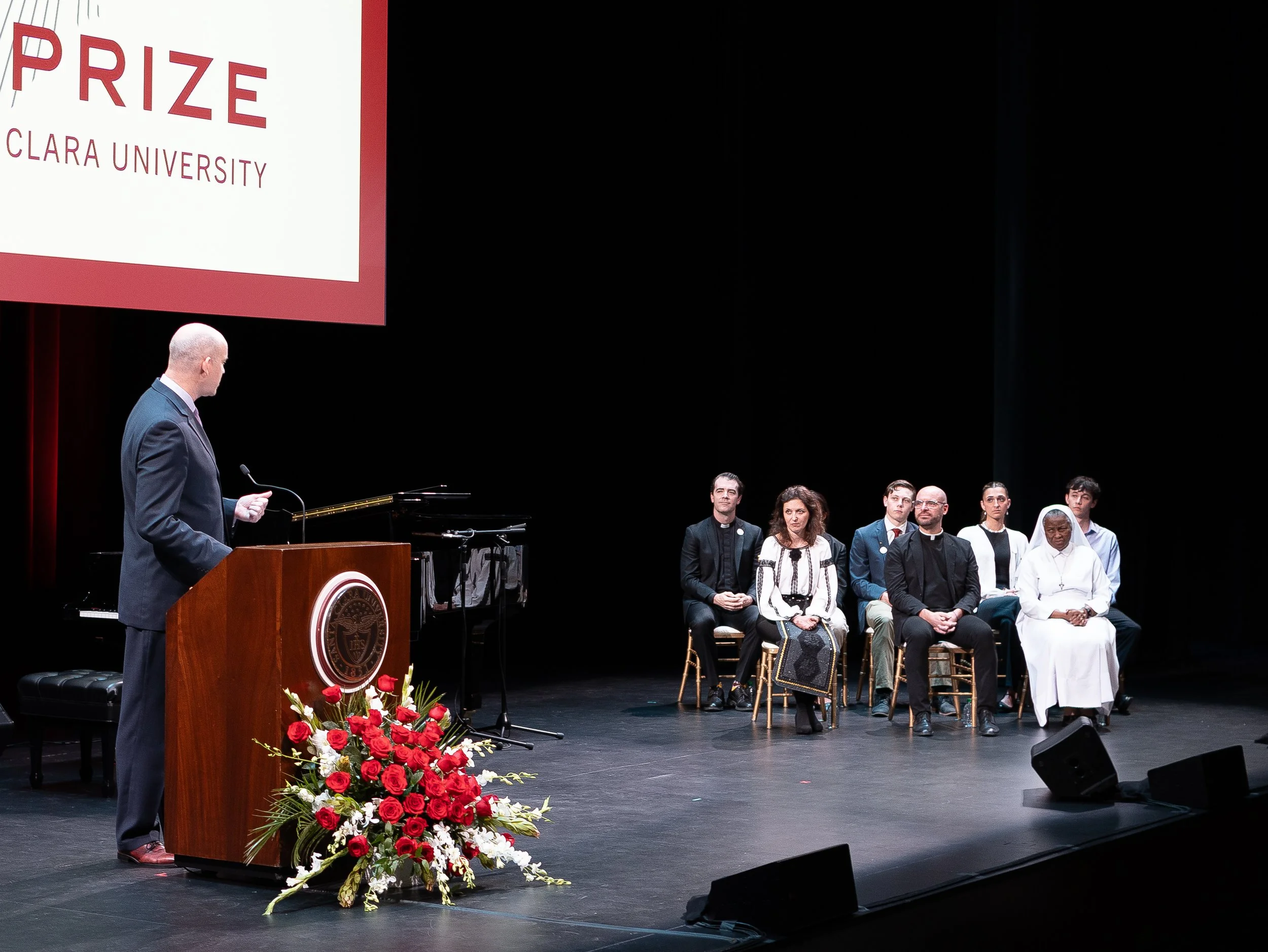Social Work Showcased: Sister Francisca Ngozi Uti Awarded Million Dollar Prize
Photo By Dylan Ryu. Sister Francisca Ngozi Uti embraces Santa Clara University president Julie Sullivan.
Sister Francisca Ngozi Uti, founder of the Centre for Women Studies and Intervention in Nigeria, received the $1 million Opus Prize on Thursday in recognition of her efforts to empower women. “The woman should walk beside the man as equals and not behind him as an inferior,” said Ngozi. With the award, Ngozi plans to prioritize sustainability in her organization.
Ngozi explained that a challenge for the Centre has been securing a stable office space for the center’s operations. “We don’t really have an office space,” Ngozi said. “One of the things I wanted people to see was the need for a dedicated space that can accommodate our work.”
Additionally, she intends to allocate part of the funds toward economic empowerment programs for women, helping them gain financial independence. “If we want women to be economically independent and to support their families, they need resources,” Ngozi said. “A mother cannot insist her daughter goes to school if she cannot help support the cost.” By equipping women with the skills and resources to contribute economically, Ngozi hopes to foster lasting change in Nigerian communities, advancing both educational and economic opportunities for women and their families.
The Opus Prize, according to their website, “is given annually to recognize unsung heroes of any faith tradition, anywhere in the world.” Santa Clara University is the 19th university to host the ceremony. This year, the Opus Foundation recognized not only Presutti’s work but also that of fellow finalists Cătălin and Bianca Albu, leaders of the Jesuit Refugee Service in Romania, and Fr. Zachariah Presutti, founder of the Thrive for Life Prison Project. Each received $100,000 to continue their humanitarian efforts.
Vice President for Mission and Ministry Matthew Carnes, one of the leading organizers of Opus Week at the University, reflected on the impact the Prize has on the finalists and the University. “This is a once-in-a-lifetime opportunity for us to raise awareness of what we're doing, but also raise awareness of these changemakers,” Carnes said. “For the candidates to be highlighted, even just being recognized, as one of the finalists does so much for them and for their work.”
The University sought to set itself apart from previous institutions that have hosted the Prize. “We probably have some of the strongest STEM programs of any of the universities Opus has ever visited,” said Carnes. “So when you couple our engineering with our business faculties, no other school has that combination, and only a few of them would have the connection we have to our Jesuit School of Theology.”
Daniel McGinty, executive director of the Opus Prize Foundation, noted that the selection process prioritizes organizations driven by faith that demonstrate a long-term commitment to their communities. “The Opus Prize is really for people who are motivated by their faith to really try to address issues within their particular communities,” he said.
Faculty, staff and students joined the Opus Prize Foundation in traveling to meet each finalist, engaging with them and observing their work being done firsthand.
This experience allowed students to understand the missions of the finalists, bring those insights back to campus and share them with the broader community.
“They were involved in site visits and in the planning committee, contributing a broader perspective,” said Carnes. He added that the student involvement was instrumental in narrowing down the nominees to the final three candidates: “Our students have actually already put a finger on the scales.”
The Opus Prize Foundation, based in Minneapolis, works with a different Catholic university each year to highlight lesser-known organizations around the world, emphasizing the role of faith in addressing social issues. Unique among similar awards, the Opus Prize does not involve a public application process. Instead, organizations are nominated confidentially; it is only once an organization becomes a finalist that they are notified by the Opus Prize Foundation.
“Opus Prize Foundation provides a monetary figure to the institution that is hosting it,” which covers many of the costs required to facilitate the various events during Opus Week, said Molly McDonald, the chief of staff for the Office of the President.
While the Opus Prize is hosted at a Catholic institution every year, the nominees, finalists and their organizations can belong to any faith, “The Opus Foundation genuinely has a multi-faith perspective to it, which I think is beautiful to to celebrate the diversity of faith traditions and what a life of service looks like in different faith traditions,” said McGinty.
Thrive for Life Prison Project, based in New York, provides educational support and dedicated housing for individuals in prison and those reentering society. “Working with people who are incarcerated or who are formerly incarcerated, particularly in this country, there's a lot of stereotypes,” Presutti said. “I think that doing this within the context of the Church, as a community of faith, one of the most beautiful things is you get a front row seat at what God is doing within people's lives.”
Daniel McGinty introduces the Opus Prize candidates during the award ceremony.
Photo by Dylan Ryu
The Thrive for Life program offers more than temporary assistance—it aims to transform lives through education and faith-driven support. “There's no other houses of study in this country for people who are coming out of prison to continue their education,” Presutti said.
With current study centers already in New York and Milwaukee, with the $100,000 Thrive for Life seeks to build a national network of support for people rebuilding their lives after incarceration. He plans to use the Opus Prize funds to expand these houses of study to other U.S. cities, extending a faith-oriented bridge for those reintegrating into society.
Cătălin and Bianca Albu, described their nomination for the Opus Prize as an unexpected blessing. “This has been a gift from God,” she said, adding that the prize would provide critical support for Jesuit Refugee Service programs. “We really live this mission to be ‘man and woman for others,’” Bianca Albu said. Bianca Albu emphasized that Jesuit Refugee Service flexibility allows it to adapt its mission to the specific needs of each community, keeping refugees at the center of its efforts.
“Our focus is always on putting people first, not an agenda or program,” Bianca Albu said. “Everything we did, we did together with the community—with the Ukrainian community, teachers, psychologists, and everyone else. We decided together what the next step would be.” This community-centered approach, she added, has kept the program “grounded in the reality of people and rooted” in providing meaningful, collaborative support.
“You may never fully understand the impact your contributions will have on the lives of those who will benefit from them,” Ngozi said. “The Opus Prize Foundation and Santa Clara University, and CWSI has been one family.”
Corrections Made Nov 20th:
Updated the Centre for Women’s Studies to Centre for Women Studies and Intervention
SCU is not the 20th university to host, it is the 19th
Molly McDonald is chief of staff in the Office of the President, instead of the University’s chief of staff

